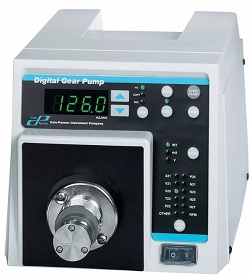AN AREA of growing interest for water suppliers is the removal of pesticides and other potentially harmful micropollutants from water being treated, but this presents an unusual challenge in the laboratory. Water being delivered to the rapid column test is needed at only low flow rates, but this flow must be perfectly even and without pulses. It should also be insensitive to changes in back pressure, which will vary as the differential pressure increases across the carbon in the columns.

Delivering tiny quanitites of spiked water, pulselessly: the Cole-Parmer gear pump
At the Water Research Centre, UK, (WRc), a recent Gear Pump installation by Cole-Parmer proved its merit for continuous flow tests with activated carbon. In these tests, samples of partially-treated water from a number of locations is ‘spiked’ with pesticides, nuisance micro-contaminants such as Geosmin, or other regulated chemicals.
WRc’s test rig uses four Cole-Parmer Gear Pumps, to provide tightly-controlled flow of water to the test columns. Flow is only 5-10ml/min.
Gear pumps proved to be the best pumping technology for the application, says Cole-Parmer, as they deliver smooth, pulseless, accurate, and repeatable flow. They can be run for long periods between maintenance, making them suitable for continuous duty.
The test rig introduces spiked water to a column containing granular activated carbon (GAC), until the contaminant breaks through in the treated water. Samples are then collected and analysed for the contaminants of interest.
The results provide valuable data for the design of new GAC treatment plants, and for the optimisation of existing facilities. By operating a test rig at small scale for two to three weeks, the performance of a full-scale plant over a couple of years can be accurately simulated.
Increasing demand for these tests has led WRc to add four more rigs to its laboratory. Robert Camm, WRc’s laboratory manager, said: “We chose Cole-Parmer’s gear pump systems as the previous pumps had provided excellent performance and reliability.”
